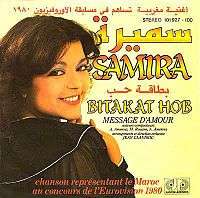Bitaqat Hub
 | |
| Eurovision Song Contest 1980 entry | |
| Country | |
| Artist(s) |
Samira Said (then Bensaïd) |
| Language | |
| Composer(s) |
'Abd Al-'Atī Amyna |
| Lyricist(s) |
Malw Rawan |
| Conductor |
Jean Claudric |
| Finals performance | |
| Final result |
18th |
| Final points |
7 |
Bitaqat Hub (Arabic: بطاقة حب, English translation: "Love card", also transliterated Bitaqat Hub, Bitaqat Hob, Bitakat Hob and in many other manners) was the Moroccan entry in the Eurovision Song Contest 1980, performed in Arabic by Samira. The song is notable in the history of the Eurovision Song Contest since this was Morocco's first (and, to date, only) appearance at the Contest. Consequently, this was also the first - and only - entry to be performed entirely in Arabic, to represent a geopolitically African country (Malta, while geographically part of the African plate is geopolitically in Europe) and to represent an Arab world country.
The reason for these apparent anomalies is that entry to the Eurovision Song Contest is open to all members of the European Broadcasting Union, a group containing states in North Africa and the Middle East. Indeed, Tunisia had intended to compete in the Eurovision Song Contest 1977, and would therefore have been involved in many of these "firsts" had it not pulled out beforehand. Subsequently, Lebanon also intended to compete in 2005 and had selected and recorded a song before withdrawing being unable to guarantee the broadcast of the Israeli entry, a move which incurred a fine and a ban from the contest until 2009.[1]
The song itself is a moderately up-tempo number, with clear influences from western disco but with Arabic overtones. Samira sings of the need for peace among the nations of the world, taking the role of "the children of the world" in order to describe a vision of a war-free, hatred-free society in which "Life is now full of peace".
The song was performed fifth on the night. At the close of voting, it had received 7 points, all of them from Italy, placing 18th in a field of 19 - ahead of perennial last-place recipient Finland.
Due to the poor finish, Morocco's then-king Hassan II is reported to have decreed that the country would not return in subsequent years. Additionally, given the presence of Israel in the Contest (Israel having opted out of the 1980 edition, which they were eligible to host, as it was scheduled on the Israeli Memorial day eve), it is unlikely that any further Moroccan entries will be forthcoming.
The result did not affect Samira's career, as she went on to become a leading recording star of the Arab world.
References
- Lyrics - Bitaqat Khub Diggiloo Thrush
- Mangan, Des (2004). This Is Sweden Calling.